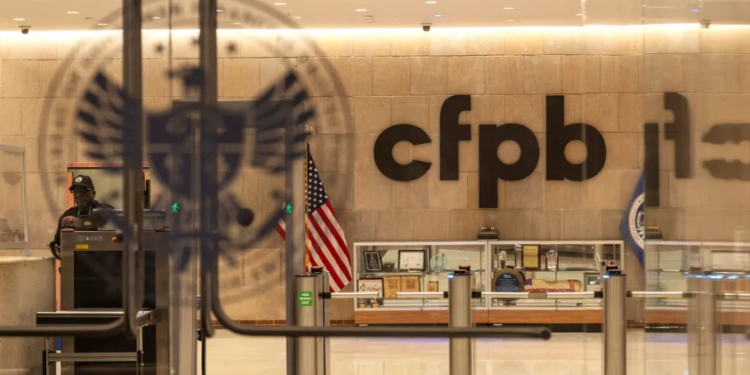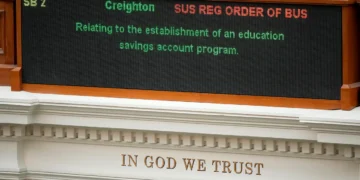March 18, 2025 Story by: Editor
A federal judge has denied Baltimore’s request to temporarily halt the Trump administration’s plan to redirect the Consumer Financial Protection Bureau’s (CFPB) reserve funds back to the Federal Reserve or the Treasury Department.
On Friday, Judge Matthew J. Maddox of the US District Court for the District of Maryland ruled against granting a preliminary injunction, stating that the plaintiffs did not provide sufficient evidence that CFPB officials had made a final and definitive decision to return the agency’s funds.
“In short, Plaintiffs fail to show that Defendants have made or acted upon a decision to transfer away the funds presently available to it to fulfill the CFPB’s statutory mandate,” Maddox said.
Kamau Marshall, chief spokesperson for Baltimore Mayor Brandon Scott (D), responded by affirming the city’s commitment to fighting for its residents. “We are carefully evaluating all available options, but Mayor Brandon Scott remains unwavering in his commitment to protecting vital assistance for Baltimore residents who have been harmed by corporate wrongdoing,” Marshall said in a statement.
The plaintiffs argue that CFPB’s consumer complaint data is essential for safeguarding residents and fulfilling other responsibilities.
“His administration will continue to advocate for justice and ensure that those affected receive the support they deserve,” Marshall added.
The CFPB has not yet provided a response to a request for comment.
After taking over as the CFPB’s acting chief on February 7, Russell Vought quickly announced that the agency would request no new funding from the Federal Reserve in its next budget draw.
Shortly after, Baltimore’s mayor, city council, and Economic Action Maryland Fund filed a lawsuit against the CFPB, alleging that Vought intended to defund the agency. While Republicans have long criticized the CFPB’s funding model—which bypasses congressional appropriations in favor of Federal Reserve transfers—the US Supreme Court upheld the practice in a ruling last year.
During a hearing last month, CFPB attorneys contended that the agency had not taken formal steps to defund itself. However, a February 11 email from CFPB Chief Operating Officer Adam Martinez indicated that the agency had reached out to the Federal Reserve to explore ways to return funds. This email was later submitted as evidence in separate litigation challenging Vought’s actions and was subsequently included by Baltimore’s legal team in their case.
Judge Maddox pointed out in his ruling that internal CFPB emails showed the agency had not identified a mechanism to return the reserve funds.
Baltimore countered that these emails were a “red herring,” citing other indications that the CFPB could move the funds.
In a February 8 letter to the Federal Reserve, Vought asserted that the CFPB’s nearly $711.6 million in funds as of January 31 was sufficient to support his vision of a more “streamlined” agency. This amount included over $412 million in unobligated funds for a downsized bureau, $220 million in reserves, and $192.3 million set aside as an operating balance.
Maddox ultimately determined that the CFPB could use its reserves to sustain legally mandated operations rather than transfer the money out and disrupt those functions.
“For the Court to intervene and entangle itself in the Bureau’s administrative processes before the agency has made any final decision about the disposition of its operating and reserve funds—and without clear indication that an unlawful and injurious decision will be made imminently—would exceed the bounds of the Court’s proper role and jurisdiction,” he wrote.
Meanwhile, Jonathan McKernan, President Donald Trump’s nominee for full-time CFPB director, addressed the agency’s future at a February 27 confirmation hearing, stating his intention to “right-size” the organization. Pressed by Senate Banking Committee Democrats, McKernan acknowledged that the CFPB “will need funding to perform our statutory responsibilities.”
On March 6, the committee voted along party lines to advance McKernan’s nomination to the full Senate.
The CFPB funding dispute is also central to a lawsuit filed in the US District Court for the District of Columbia by the National Treasury Employees Union (NTEU), which represents many CFPB employees, along with other plaintiffs.
That case covers broader issues, including challenges to the dismissal of probationary employees, the termination of time-specific contracts, and whether the CFPB is fulfilling its legally mandated duties.
At a March 11 hearing, Judge Amy Berman Jackson indicated she was “leaning” toward issuing a preliminary injunction in that case.
Baltimore and its co-plaintiffs are represented by the Democracy Forward Foundation.
The case is Mayor and City Council of Balt. v. CFPB, D. Md., No. 1:25-cv-00458, Memorandum 3/14/25.
Source: Bloomberg Law

















